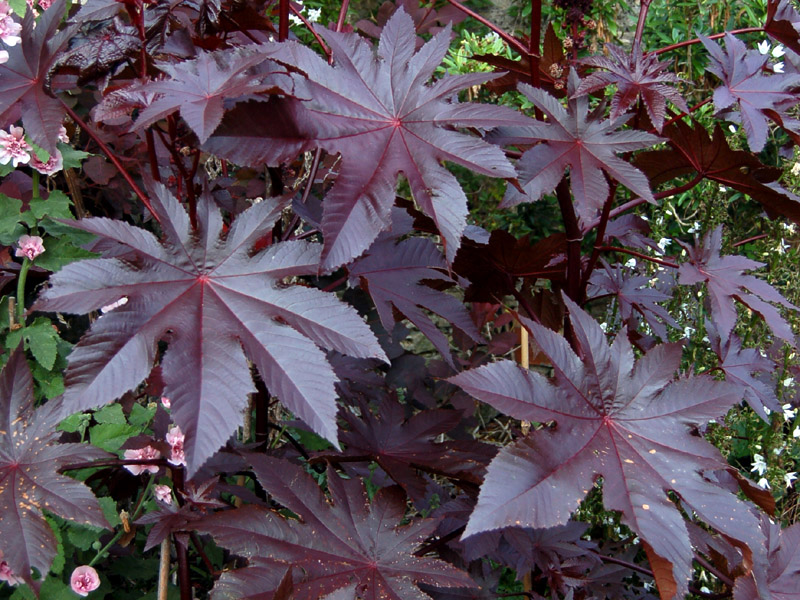Hello, plant lovers! I’ve been growing Ricinus communis ‘New Zealand Black’ for a few years now, and I can’t wait to share everything I know about this beautiful decor plant. If you’re a seasoned gardener or a beginner, this guide will help you grow and take care of this beautiful variety.
What Makes New Zealand Black Special?
The New Zealand Black variety of Ricinus communis (commonly known as castor bean) stands out with its:
- Deep purple-black foliage
- Compact growth habit compared to other varieties
- Less branching tendency
- Striking dark coloration that intensifies in full sun
- Perfect size for smaller gardens (typically 4-6 feet tall)
Growing Requirements
Here’s what your New Zealand Black castor plant needs to thrive
Soil & Location
- Rich, well-draining soil
- Full sun exposure
- Protected from strong winds
- pH level: 6.0-7.0
- Spacing: 4 feet between plants
Climate & Temperature
- USDA zones 9-11 for perennial growth
- Grows as annual in cooler regions
- Minimum temperature: 32°F (0°C)
- Best growth in warm conditions
Planting Guide
I’ve found the best success with this method
-
Starting Seeds
- Start indoors 6-8 weeks before last frost
- Soak seeds overnight before planting
- Plant 1-1.5 inches deep
- Keep soil temperature around 70°F
- Germination occurs in 1-3 weeks
-
Transplanting
- Wait until soil warms to 60°F
- Choose a sunny location
- Space plants 4 feet apart
- Water thoroughly after planting
Care & Maintenance
Watering Schedule
- Regular watering during establishment
- Moderate once established
- Drought tolerant but performs better with consistent moisture
Fertilization
- Monthly feeding with balanced fertilizer
- Extra nitrogen promotes leaf growth
- Reduce feeding in late summer
Common Problems & Solutions
We’ve all faced these issues – here’s how to handle them:
Pests
- Spider mites in hot, dry conditions
- Aphids on new growth
- Solution: Regular inspection and insecticidal soap if needed
Diseases
- Leaf spot in wet conditions
- Root rot in poorly drained soil
- Prevention: Good air circulation and proper spacing
Design Tips
I love using New Zealand Black in these ways:
- As a dramatic focal point
- Combined with:
- Silver-leaved plants
- Bright yellow or orange flowers
- Purple companion plants
- In large containers
- As a temporary privacy screen
Safety Considerations
⚠️ Important safety notes:
- All parts are toxic, especially seeds
- Keep away from children and pets
- Remove seed pods before they mature if safety is a concern
- Wear gloves when handling plants
Seasonal Care
Spring
- Start seeds indoors
- Prepare planting site
- Transplant when weather warms
Summer
- Regular watering
- Monthly feeding
- Monitor for pests
Fall
- Remove plants after frost (in cold regions)
- Collect seeds if desired
- Clean up garden debris
Winter
- Store seeds in cool, dry place
- Plan next year’s garden
- Order seeds early
Pro Tips from My Experience
After growing these beauties for years, here’s what I’ve learned:
- Start more seeds than you need – germination can be unpredictable
- Don’t overwater young plants – they hate wet feet
- Give them room to grow – they get bigger than you expect
- Plant in groups of 3 for maximum impact
- Add mulch to retain moisture and suppress weeds
FAQ
Q: How tall will my New Zealand Black get?
A: Usually 4-6 feet in one season, shorter than other varieties
Q: Can I grow it in containers?
A: Yes! Use minimum 5-gallon containers with good drainage
Q: Is it really black?
A: More deep purple-black, especially intense in full sun
Q: How long does it take to reach maturity?
A: About 140-180 days from seed to full size
Final Thoughts
Ricinus communis ‘New Zealand Black’ is one of my favorite dramatic plants for the garden that makes a big statement right away. Although you need to be extra careful around it because it is poisonous, the beautiful dark leaves and architectural presence make it worth it.
When you’re enjoying this beautiful plant, remember to always put safety first. If you have any questions about how to grow your own New Zealand Black castor plant, don’t hesitate to get in touch. Happy gardening!.
Do you want me to go into more detail about any one part of growing this plant?

Finding light for New Zealand Black Castor Bean in your home
New Zealand Black Castor Bean love being close to bright, sunny windows .
Place it less than 1ft from a south-facing window to maximize the potential for growth.
New Zealand Black Castor Bean does not tolerate low-light .
Pick your area to see how the weather right now affects where you should put your New Zealand Black Castor Bean
Taxonomy Scientific name
New Zealand Black Castor Bean needs 0. 5 cups of water every 9 days if it’s in a 5″ pot and doesn’t get direct sunlight.
You can use our water calculator to get personalized watering advice based on your area, or you can download Greg to get more detailed advice for all of your plants.
Water 0.5 cups every 9
Does your plant get direct sunlight? No Yes
Select the pot size
Greg is a plant care intelligence that has learned how plants work so you can grow with confidence!
